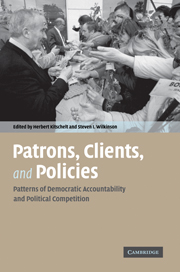Book contents
- Frontmatter
- Contents
- List of figures
- List of tables
- Acknowledgments
- List of contributors
- 1 Citizen–politician linkages: an introduction
- 2 Meet the new boss, same as the old boss? The evolution of political clientelism in Africa
- 3 Monopoly and monitoring: an approach to political clientelism
- 4 Counting heads: a theory of voter and elite behavior in patronage democracies
- 5 Explaining changing patterns of party–voter linkages in India
- 6 Politics in the middle: mediating relationships between the citizens and the state in rural North India
- 7 Rethinking economics and institutions: the voter's dilemma and democratic accountability
- 8 Clientelism and portfolio diversification: a model of electoral investment with applications to Mexico
- 9 From populism to clientelism? The transformation of labor-based party linkages in Latin America
- 10 Correlates of clientelism: political economy, politicized ethnicity, and post-communist transition
- 11 Political institutions and linkage strategies
- 12 Clientelism in Japan: the importance and limits of institutional explanations
- 13 The demise of clientelism in affluent capitalist democracies
- 14 A research agenda for the study of citizen–politician linkages and democratic accountability
- References
- Index
4 - Counting heads: a theory of voter and elite behavior in patronage democracies
Published online by Cambridge University Press: 27 October 2009
- Frontmatter
- Contents
- List of figures
- List of tables
- Acknowledgments
- List of contributors
- 1 Citizen–politician linkages: an introduction
- 2 Meet the new boss, same as the old boss? The evolution of political clientelism in Africa
- 3 Monopoly and monitoring: an approach to political clientelism
- 4 Counting heads: a theory of voter and elite behavior in patronage democracies
- 5 Explaining changing patterns of party–voter linkages in India
- 6 Politics in the middle: mediating relationships between the citizens and the state in rural North India
- 7 Rethinking economics and institutions: the voter's dilemma and democratic accountability
- 8 Clientelism and portfolio diversification: a model of electoral investment with applications to Mexico
- 9 From populism to clientelism? The transformation of labor-based party linkages in Latin America
- 10 Correlates of clientelism: political economy, politicized ethnicity, and post-communist transition
- 11 Political institutions and linkage strategies
- 12 Clientelism in Japan: the importance and limits of institutional explanations
- 13 The demise of clientelism in affluent capitalist democracies
- 14 A research agenda for the study of citizen–politician linkages and democratic accountability
- References
- Index
Summary
The observation that patronage politics and expectations of ethnic favoritism go together is supported by a well-documented consensus among scholars of patronage democracies. According to Kearney, a student of Sri Lanka: “A common expectation seems to be that a person holding a public office or other position of power will use his position for the near-exclusive benefit of his ‘own’ people, defined by kinship, community or personal loyalty” (1973: 8). According to Haroun Adamu, a student of Nigerian politics: “It is strongly believed in this country that if you do not have one of your own kin in the local, state and/or national decision-making bodies, nobody would care to take your troubles before the decision makers, much less find solutions to them” (quoted in Joseph 1987: 67). Kenneth Post's description of elections in Nigeria emphasizes much the same point: “It was rare for a man to stand for election in a constituency which did not contain the community in which he was born. It did not matter if he had been educated elsewhere and had his business interests outside the community in which he was born, so long as he regarded it as his home. He would still be a better representative for it than someone who came from outside, who could not even speak in the same tongue” (1963: 391).
- Type
- Chapter
- Information
- Patrons, Clients and PoliciesPatterns of Democratic Accountability and Political Competition, pp. 84 - 109Publisher: Cambridge University PressPrint publication year: 2007
- 40
- Cited by



